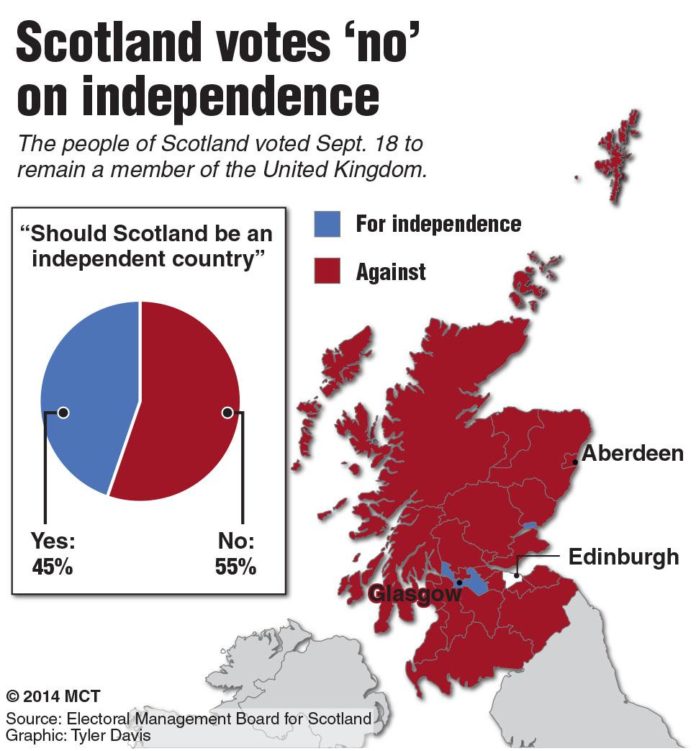In a historic exercise of popular democracy, the majority of the people of Scotland voted “no” on a proposition asking whether Scotland should be an independent country. Through a 55 to 45 percent majority, the Scots committed themselves to remain within the United Kingdom for the time being, and maintain a three-centuries-long bond with England. There are a myriad of reasons why the Scots chose “no” to independence, some emotional and others logical. In this author’s opinion, the correct decision was made on the night of the referendum – though it is definitely the beginning of the end for status quo politics in the United Kingdom. Allow me to explain.
Firstly, the Scots made an excellent choice by rejecting independence. In the current economic and political climate, both the world and Scottish economy are simply not prepared for the sea-change that would be the dissolving of the United Kingdom. In preparation for possible independence, corporations moved offices and headquarters southwards to England – this shift of business would only increase upon independence and leave the Scottish economy in a tailspin. This recessive economic situation, coupled with a sharp decrease in the value of the pound sterling, would leave Scotland the recipient of one of the worst economic maelstroms to visit the western world since the end of the Second World War. The solution to this potential crisis, as Scottish First Minister Alex Salmond proclaimed, was the revenues from potential oil and natural gas in Scotland’s Exclusive Economic Zone (EEZ) in the North Sea, and a currency union between England and Scotland. Oil, to me, seems like a very short-term way of thinking. Should Scotland’s economic fortunes be predicated on the, again, potential revenues of the extraction of natural gas and oil, that is a high-risk gamble to put on the backs of five million citizens in a newly independent Scotland, who is not even assured of immediate accession to the European Union and its economic safety nets. Also, a currency union? Mr. Salmond, please, would England truly be in a mood to share the pound sterling when the Scottish state’s economy is built on sand worse than the Euro’s? Not a chance.
As for the second gist of this article, despite the failure of Scots to democratically achieve their independence, the time has come to end the status quo in British political life. At the moment, there are four “countries” within the United Kingdom, three of which have devolved powers. Scotland, Wales and Northern Ireland control various portions of their own lawmaking. However, England is still completely beholden to the national government of the United Kingdom, to which all constituent countries send members to parliament (MPs). Thus, the West Lothian question burns bright and problematic as ever – that is, a Scottish MP can vote on a bill pertaining only to a situation in England, but an English MP cannot vote on a similar one pertaining to just Scotland. This, naturally, is unfair to the citizens of England. The simplest solution would be to restrict the types of bills MPs can vote on so no, say, Welsh MP can vote on whether or not to fund a bridge project over the Thames. This would create, in essence, an English parliament within the British national parliament. However, in creating a “second class” of MPs, the ire of the Labour party would be drawn. If one examines election statistics, it is almost impossible for the Labour party to form an easy majority in the House of Commons without Labour MPs from Scotland and Wales. Thus, Labour would have to completely redesign their party platform twice in as many decades, or give effective control to the Conservative party.
Therefore, I think it would be wise, within the next decade, for the United Kingdom to consider creating a more federalist state with individual English, Welsh, Scottish and Northern Irish parliaments dealing with issues pertaining only to them – with a national government still located in Westminster to deal with defense, foreign policy, and other issues that effect the kingdom as a whole. Whether this will come to pass, or not, remains to be seen. In the meantime, break out the union flags and sing “Rule Britannia” as powerfully as ever!
If one is interested in learning more about things I have mentioned, there are various guides of excellent quality available online from the BBC, The Telegraph, and The Guardian.







